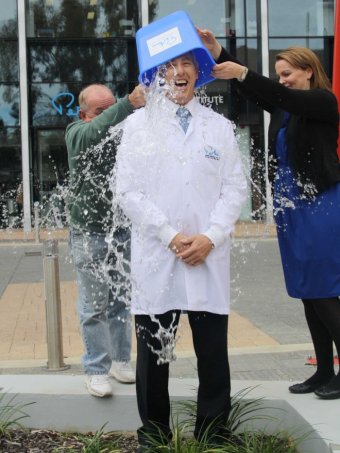A social media campaign that saw people across the world doused with ice-cold water raised $1 million for an Australian team researching motor neurone disease (MND).
The ice bucket challenge, to raise funds and awareness for MND began in the US and went viral in the second half of 2014.
Celebrities including Bill Gates and Kermit the Frog took part in the challenge.
Nearly a year on, donations from 30,000 Australian participants have funded a grant which is the largest to ever be awarded by the Motor Neurone Disease Research Institute of Australia’s Research Committee.
Professor Nigel Laing from the Harry Perkins Institute of Medical Research in Perth is one of 16 researchers to share in the funding.
He said he never expected the social media campaign would generate $1 million for research.
“The ice bucket challenge was just a phenomenon last year,” he said.
“In some ways it can be looked at as one of these crowd funding exercises, where an awful lot of people put together small to medium sized amounts of money which has resulted in this amazing grant in the end.
“It’s an awful lot of money.”
Researchers aim to find cause of sporadic MND
MND affects about 2,000 people in Australia at any one time, with about 700 people diagnosed in Australia each year.
Life expectancy after diagnosis is about three years.
Researchers will use the $1 million grant for an Australia-wide project to try to understand what causes sporadic MND, which represents about 90 to 95 per cent of cases.
“Cracking the enigma of sporadic motor neurone disease has, up until now, proved impossible,” said Professor Laing.
“[The disease] has been investigated for years and years, all sorts of theories have been put forward as to where and how it might arise, and to date, nothing really concrete has come out of that.”
Researchers are aiming to obtain clinical information and bank DNA samples from every patient in Australia with sporadic MND over a three-year period.
“The main thing about this project is that we will… use new genetic techniques to try and understand the genetics of sporadic motor neurone disease,” he said.
“You could say the tools have not been invented up until now to do what this project aims to do.”
Professor Laing has been involved with the Motor Neurone Disease Association of WA since it started in the early 1980s.
He confessed while he personally had not undertaken the ice bucket challenge, he had poured buckets of icy water over others.
Professor Laing said MND research was “very close” to his heart.


